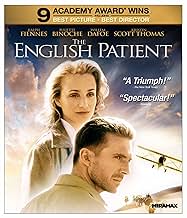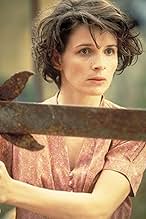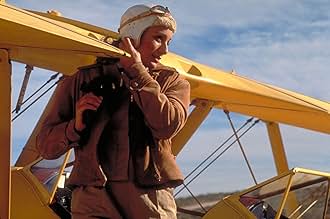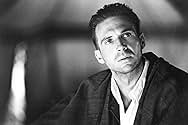Al final de la Segunda Guerra Mundial, una joven enfermera atiende a una víctima de accidente de avión gravemente herida. Conocemos su historia en flashbacks que revelan un fatídico romance.Al final de la Segunda Guerra Mundial, una joven enfermera atiende a una víctima de accidente de avión gravemente herida. Conocemos su historia en flashbacks que revelan un fatídico romance.Al final de la Segunda Guerra Mundial, una joven enfermera atiende a una víctima de accidente de avión gravemente herida. Conocemos su historia en flashbacks que revelan un fatídico romance.
- Dirección
- Guionistas
- Elenco
- Ganó 9 premios Óscar
- 62 premios ganados y 78 nominaciones en total
- Dirección
- Guionistas
- Todo el elenco y el equipo
- Producción, taquilla y más en IMDbPro
Opiniones destacadas
The English Patient may be a slow movie, with all the dates, character relationships and events unfolding at a purposefully leisurely pace, but it is also intensely moving, beautifully shot and compelling. The film looks stunning, the dessert scenes especially are reminiscent of the epic sweeping feel that Lawrence of Arabia had. The cinematography is incredibly beautiful, and the costumes and scenery are wonderfully lavish and evoke the period seamlessly. The English Patient has a truly haunting and heart-wrenching score, particularly in the end credits, complete with some fitting music choices. The film also has a poetic and thought-provoking script, a compelling story that conveys the characters' predicaments wonderfully complete with flashbacks that enhance rather than jar and superb direction by the late and very talented Anthony Minghella.
The English Patient has a strong emotional impact as well, the climatic sequence in particular moved me to tears that stayed long after the movie was over. The characters are richer and more complex than one might think, Almasy especially is very haunted and pained, and dealt with in an incredibly subtle way. The acting does perfect justice to these characters, Ralph Fiennes is absolutely brilliant in one of his best and more complex performances(I'd say only Schindler's List is better), and Kristen Scott Thomas shows a great chemistry with him, the scene where she is carried out of the cave by him is one of extreme pathos. Juliette Binoche is equally affecting, and Willem Dafoe and Kevin Whately are as strong as ever.
All in all, a moving and beautiful film, cinematically and emotionally. 9/10 Bethany Cox
"The English Patient", based on a novel by the same name by Michael Ondaatje, is like "The Godfather: Part II" (1974) in the sense of how it's constructed. It's a blending of two stories: the past and the present and it all revolves around the titular character: an English patient in the post years of World War Two. Ralph Fiennes plays the English patient, who has been scarred for life by a plane crash, and being taken care of in an isolated church by a single nurse played marvelously by Juliette Binoche. Apart from bonding with her raspy-voiced, troubled patient, Binoche comes to learn about his past when a stranger (Willem Dafoe) arrives and the two men appear to know each other.
That's just one of the two beautifully crafted stories that shape this film. The other one, told in flashback, is the patient's past, before he was scarred and dying in a bed. The story of the present mixed with the patient's past and his love affair that tragically changed his life forever.
To be blunt, "The English Patient" is a love story blended with a sweeping epic sensation and it blends magnificently. What I really admired about the love story between Ralph Fiennes and Kristin Scott Thomas was how passionate, how obsessive, how enchanting it was shown on screen. Usually in love stories, such as Minghella's later "Cold Mountain" (2003), the romantic elements seem far more lustful than obsessive to me. Some of the love scenes feature elements that may tend to be associated more with lust than love, but still, because it is so well developed and not rushed and not exploited out of proportion, we can believe that there is a sure, true love between these characters. It reminded me a lot of "Vertigo" (1958) in how well the filmmakers and performers convinced us that these were two actual human beings who truly fell in love with each other.
Performances all around were great. I was especially enthralled by the performance by Juliette Binoche, who took home the Oscar for her performance the following year. I also liked Willem Dafoe playing the sort of cynical, questionable character that he's always quintessential at playing. And of course I can't leave out Fiennes and Scott Thomas and their portrayals of two very passionate lovers.
Despite my enormous enthusiasm for this epic, I would be dishonest if I were to describe it as a perfect film. There are two flaws that I cannot glance over. Number one, it is a little too long and the reason for this is my second complaint, there are a few unnecessary subplots. I was not enchanted or particularly interested with the second love story between Binoche and a bomb specialist played by Naveen Andrews. My research has led me to assume that this plot element comes from the original book and I'm sure it worked perfectly in there, but in the film, it just seems a little distracting and the relationship between the two characters didn't fascinate me. I was far more interested by Fiennes character and his relationships with his two leading actresses.
Nevertheless, these two flaws are easily forgivable even if they do slow things down a bit. Those put aside, "The English Patient" is an extraordinary achievement of film-making. To me, it was sort of like an insane mix up between "Casablanca" (1942) and "Lawrence of Arabia" (1962), two remarkable and better films, and this effective blend proved to be well worth my time. It is a real shame that Anthony Minghella has left us. For he was a truly gifted filmmaker. This is all the evidence anybody needs.
This is quite a modern epic. It has the running time of an epic, it has the gorgeous cinematography of an epic, it has the acting of an epic and it has a story of love (lust) against the backdrop of major events in history. Even though it changes or leaves out a significant amount of the original novel it still manages to be a great mix of passionate desire and mystery. The mystery of the story is represented by the thief Caravaggio who casts light on what he knows of de Almásy's past (as he sees it) while the love story is unfolded as it develops in a passionate affair between him and Katherine, a colleagues' wife. The story is compelling enough to carry the long running time, at times the pace seems a little slow and when I saw it in my local multiplex there were some moments where large portions of the audience seemed to be shifting in their seats.
The love' of the story was interesting as it seems to be contrasted with Hana's relationship with Kip the bomb disposal expert. While de Almásy's relationship with Katherine starts as lust and desire before growing into what seems to be love (or could be grief at the result of their affair), Hana's is portrayed as purer and more careful as she fears those she loves will die. This difference helped me see that the film did want to show the destructive power of lust and affairs, however the fact that the central relationship was based more on lust than love took away from the emotional core of the story.
The acting is almost impeccable. Fiennes is excellent even when he is lost behind an unrecognisable mask of burnt flesh. Thomas is actually very good, I find she tends to be very wooden in some things but this type of very English character brings the best out of her. Binoche is excellent as Hana and carries the heart of the film. Dafoe is truly excellent - his element of the story is the mystery and he does it well. He is a great actor and deserves to be in things this good. The support cast include plenty of good actors including Colin Firth, Jurgen Prochnow and Naveem Andrews.
The film is beautifully shot - even though it's all a bit too picturesque to be real! However the director can handle himself well with many different scenes - a tense bomb diffusal, a passionate love scene, a dangerous sand storm etc. Overall the slow pace may frustrate some younger audiences but this is a really good film that draws it's values from classy sources.
I'm sure many of those who hated it are much like a co-worker of mine who said "Books? I haven't a book since I had to in high school." I checked some of the names of the people who reviled this movie and sure enough it seems many of them think Armaggedon was an "awesome" movie and Chris Farley was a "Comic genius". And that's O.K. Taste is an individual thing.
My sensibilities tell me that the english patient is a very good movie that takes effort to appreciate. Much in this movie is very subtle. It is not a vacation for the brain.(Hey, sometimes the brain NEEDS a vacation, and stupid movies provide that!) Also, it is not a cynic's movie. It's about idealism, tragedy and regret. About how people can want the best but have it all fall apart because of bad choices, and have to go on with the regret of never being able to remedy the situation. Not so much a love story as a tragic one. So many people destroyed because of the selfishness of two people couldn't(wouldn't?) control themselves.
I would ask those who thought the movie boring to watch it again when you feel able to pay full attention to what's going on in the film and how different bits of dialogue dovetail into subtle suggestions of how the characters are feeling and thinking. This movie takes an investment of time, thought and emotion. If this investment is made, I think most people who watch it will feel rewarded.
Oscars Best Picture Winners, Ranked
Oscars Best Picture Winners, Ranked
¿Sabías que…?
- TriviaThe Germans who shoot at Almásy's plane at the beginning were actually tourists roped into the production because they couldn't afford any more extras.
- ErroresKatharine Clifton (Scott-Thomas) explains to Count László Almásy (Fiennes), that her husband is map making in Ethiopia. The year at this point is 1939, and the country was known as Abyssinia until 1945.
- Citas
Katharine Clifton: My darling. I'm waiting for you. How long is the day in the dark? Or a week? The fire is gone, and I'm horribly cold. I really should drag myself outside but then there'd be the sun. I'm afraid I waste the light on the paintings, not writing these words. We die. We die rich with lovers and tribes, tastes we have swallowed, bodies we've entered and swum up like rivers. Fears we've hidden in - like this wretched cave. I want all this marked on my body. We are the real countries. Not boundaries drawn on maps with the names of powerful men. I know you'll come carry me out to the Palace of Winds. That's what I've wanted: to walk in such a place with you. With friends, on an earth without maps. The lamp has gone out and I'm writing in the darkness.
- Créditos curiososDisclaimer in end credits: "While a number of the characters who appear in this film are based on historical figures, and while many of the areas described - such as the Cave of Swimmers and its surrounding desert - exist and were explored in the 1930s, it is important to stress that this story is a fiction and that the portraits of the characters who appear in it are fictional, as are some of the events and journeys."
- Bandas sonorasYes! We Have No Bananas
Words and Music by Frank Silver and Irving Cohn (as Irving Conn)
Published by Skidmore Music Co., Inc.
Selecciones populares
Detalles
- Fecha de lanzamiento
- Países de origen
- Sitios oficiales
- Idiomas
- También se conoce como
- The English Patient
- Locaciones de filmación
- Productoras
- Ver más créditos de la compañía en IMDbPro
Taquilla
- Presupuesto
- USD 27,000,000 (estimado)
- Total en EE. UU. y Canadá
- USD 78,676,425
- Fin de semana de estreno en EE. UU. y Canadá
- USD 278,439
- 17 nov 1996
- Total a nivel mundial
- USD 231,976,425
- Tiempo de ejecución2 horas 42 minutos
- Color
- Mezcla de sonido
- Relación de aspecto
- 1.85 : 1








































